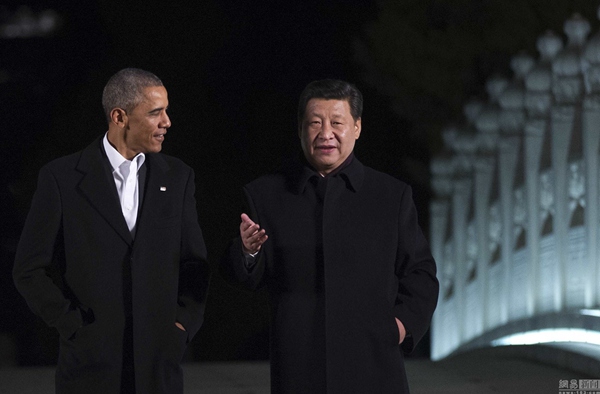US diplomacy in 2014: Confidence and challenges
- By Wei Hongxia
 0 Comment(s)
0 Comment(s) Print
Print E-mail cntv.cn, December 25, 2014
E-mail cntv.cn, December 25, 2014
According to observers, the "reset" policy has failed to improve Russia-US relations. Obama lost some popularity because of concerns that he is dragging his country into a danger of a new war — with Russia.
The US, together with its European allies, launched sanctions on Russia. While Russia was on the brink of economic collapse, the EU's nerves were at a breaking point because of the 2015 fiscal problem. Given that EU has strived to save Ukraine, will it be dragged into an economic dilemma? How can the US protect the gains from its economic resurgence if there is an EU economic crisis? There are adequate reasons to believe that all trans-Atlantic leaders are wary of this.
Although frictions persist between the US and China over bilateral relations, the two countries continue to make efforts to manage differences. Obama met Xi Jinping twice in 2014, and both repeatedly called for dialogues and mutual understanding.
|
|
|
President Xi Jinping and US President Barack Obama go on a stroll in Zhongnanhai, the area of Beijing known as the heart of the government, on Nov 11, 2014.[Photo/Xinhua] |
In November, Obama attended the informal meeting of APEC leaders in Beijing, and was invited to the Yingtai talks and had an in-depth exchange of views with Xi. During the meeting, the two sides signed some agreements on cooperation on climate change, trade negotiations and combating Ebola.
Bilateral military relations continue to progress. In the past, military relations were often the most sensitive topics in bilateral relations and were often suspended. But over the past year, military exchanges between the US and China are being strengthened. Despite the encouraging momentum, differences still need to overcome.
After China proposed the concept of "new type of major-power relations," US policy circles have frequently discussed the subject, but they are deriving negative interpretations and even draw adverse conclusions.
Speaking at the quarterly Business Roundtable meeting on Dec. 3, Obama praised China, but it remains unclear how he will improve US-China relations in his last two years in office.
What is clear is that in Obama’s last two years, as a "lame duck" president, he will make efforts to foster and strengthen his policy legacy. "Pivot to Asia" or "Rebalancing Asia-Pacific" will become a hallmark of his foreign policy legacy after his term ends.
But the pivot policy has contributed to tensions between China and the US, and to difficulties among China and its Asian neighbors. If President Obama pushes more efforts into pushing pivot policy further, it will probably grow more complex with greater tensions in West Pacific.
Obama and his administration will enter the new year with new confidence because of economic growth and reconciliation with Cuba, but significant challenges remain.
The author is a columnist with China.org.cn. For more information please visit: http://www.china.org.cn/opinion/weihongxia.htm







Go to Forum >>0 Comment(s)